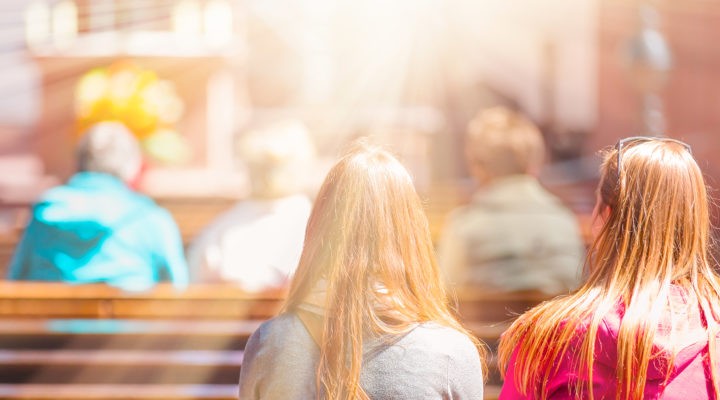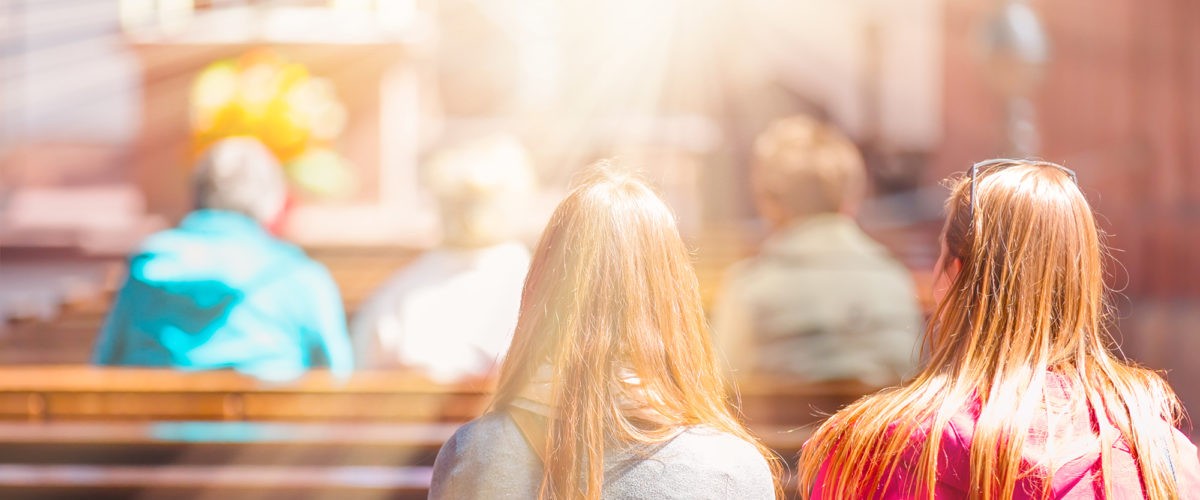Americans are cautiously returning to in-person religious services as vaccination rates rise and COVID-19 deaths decline, according to a survey conducted this month.
But the Pew Research Center study also found that attendance at weekly services remains lower than pre-pandemic levels and that there will be an anemic turnout for Easter for the second year. Still, the change in attitudes is undeniable.
“Three-quarters of U.S. adults who normally attend religious services now say they are ‘very’ or ‘somewhat’ confident they can do so safely, without spreading or catching the coronavirus — up 12 percentage points from when this question was last asked in July 2020. Over that period, there also has been a considerable drop in the share who say they think their congregation should be closed to help stop the spread of the virus,” Pew said in a summary of the March 1-7 study. Of the 12,055 U.S. adults surveyed online, 15% said they would prefer their congregations remain closed, down from 28% in July.
Those physically attending worship increased from 33% to 42% from July to early March as those saying they tuned into virtual services dropped from 72% to 65%.
In-person attendance has risen during that time frame, while participation in virtual programming has decreased, Pew said. Those physically attending worship increased from 33% to 42% from July to early March as those saying they tuned into virtual services dropped from 72% to 65%.
But these trends are far from the norm. A majority of those who previously attended services twice a month or more reported not attending in the month prior to the survey, Pew said, and only 39% of Christians in the U.S. said they will worship in person on Easter Sunday — down from 62% who say they typically do.
“Furthermore, while growing numbers of religious attenders think their congregations should be open, the clear majority continues to say that various modifications and restrictions — such as social distancing, mask-wearing and limiting the number of people who can attend at any one time — are needed to continue the fight against the spread of the virus. And these kinds of modifications remain widespread.”
When asked about the status of their houses of worship, 17% said facilities remain closed, two-thirds reported buildings are open on a modified basis, and 12% said their congregations are open and operating normally, Pew said.
17% said facilities remain closed, two-thirds reported buildings are open on a modified basis, and 12% said their congregations are open.
By far, the latter category is being driven by evangelical Christians, according to the survey. “Overall, half of evangelicals who typically attend religious services at least monthly say they have attended church in person during the past month. And half of all evangelicals (not just those who normally attend) say they plan to attend Easter Sunday services in person this year.”
By comparison, 36% of Catholics, 31% of Black Protestants and 27% of mainline Protestants said they would be in church on Easter.
At the other end of the spectrum from evangelicals are Black Protestants. While typically a highly observant group, only 21% told Pew they had physically attended church in the previous month.
Their caution is tied to the pandemic hitting persons of color particularly hard.
“For example, Black Americans are less likely than non-Hispanic white adults to say they attended religious services in person during the past month or that they are ‘very confident’ they can now attend religious services safely,” the survey found. “And fully three-in-10 Black religious attenders say their congregation should be closed altogether because of the outbreak, far higher than the share of white (non-Hispanic) and Hispanic adults who feel the same way.”
Despite the numbers of people returning to in-person religious gatherings, most respondents said their congregations continue to stream or broadcast services, ranging from 87% of evangelical and mainline churches to 73% of Catholic parishes.
Republicans are more than twice as likely as Democrats to say they have attended services in person during the past month.
Politics also plays a part in the trends, Pew found. “Republicans and those who lean toward the Republican Party are far more comfortable than Democrats and Democratic leaners with returning to normal congregational life sooner rather than later. Among those who typically attend religious services on a monthly basis (or more), Republicans are more than twice as likely as Democrats to say they have attended services in person during the past month (57% vs. 26%).”
Six-in-10 Republicans also expressed extreme confidence in the safety of immediately returning to in-person religious gatherings, compared to 25% of Democrats, Pew added. “And about seven-in-10 Republicans who say they typically attend Easter services also say they intend to do so in person this year (71%), while fewer than half of Democrats who typically go to church on Easter plan to go in person this year (42%).”
The survey also asked respondents to rate the impact of the pandemic on personal faith. It found that “roughly one-quarter of U.S. adults say their religious faith has grown stronger as a result of the pandemic, while 4% say their faith has been weakened; the remainder say that their faith has not changed much, including those who say they were not religious to begin with and still are not.”
Black Americans are the most likely to say their faith has increased during the coronavirus outbreak, Pew added. “Overall, 38% of Black adults say their faith has grown stronger as a result of the pandemic, compared with 27% of Hispanic adults and 19% of non-Hispanic white adults who say this.”
Related articles:
In-person worship dropped in January as more churches were directly affected by COVID
Most churchgoers say they’ll return to in-person worship after COVID
Churchgoers say they’ll return to in-person worship
These churches will resume in-person gatherings only when it’s safe for all


